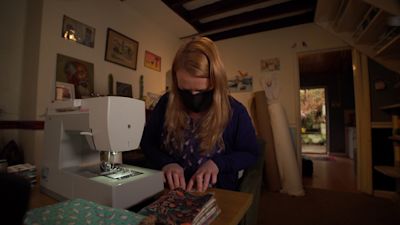Insight
How a Welsh entrepreneur is tackling plastic pollution 'one reusable sponge at a time'

From relying on a foodbank to exporting her own product across Europe - Kerry Mackay explains why the environment is at the forefront of her small business
As businesses of all sizes plan for the year ahead, many are looking at how they can reduce their carbon footprint and step up their efforts to tackle climate change.
Every sector, from construction firms monitoring their mileage to the climate impact of how much data firms use, is under scrutiny.
With business costs rising - notably energy and fuel prices - reducing use and switching to greener alternatives not only protects the planet, but it's good for the bottom line too.
New startups increasingly have the planet at their heart. These are values driven businesses with a desire to look at "whole costs" including impacts of their operations on the environment.
Kerry Mackay founded her micro-business Scrubbies wanting to change the world one reusable sponge at a time.
She now makes 30,000 of the washable, biodegradable, home-compostable cleaning pads a year and exports all over Europe from her kitchen table.
Hers is literally a cottage industry: working and making at home in Glyn Ceiriog near Wrexham.
Kerry said she didn't realise one person and a simple switch to a fully compostable product could make such a difference.
"It has been really empowering starting my own business and helping to reduce the global plastic crisis," she said while machining another plastic-free sponge.
She also recently been named in Small Business Britain's top 100 inspiring female entrepreneurs.
However many small businesses in Wales say they don't have the time or the resources they need to be greener.
Small business owners have issued a reality check about their own progress with sustainability plans, according to a survey from the Association of Chartered Certified Accountants (ACCA UK) and The Corporate Finance Network (CFN).
Small business owners said the number one issue holding businesses back from making their operations more sustainable is lack of time and the resources to implement environmental strategies.
Company bosses also highlighted their own lack of expertise and understanding of where to start with sustainability plans.
As firms navigate their way through the pandemic and financial fall out, being greener is not a priority for many leaders of small enterprises in Wales.
Accountants reported that just 1% of Welsh clients have requested support from them on sustainability issues.
The SME (small and medium-sized entreprise) Tracker survey reflects the challenges faced by small business owners trying to be more conscious of sustainability, while still tackling a multitude of critical issues caused by the pandemic.
These include battling supply chain concerns, hiring skilled talent and managing financial pressures due to rising inflation and the cost of finance.
The SME Tracker, which reports what small businesses tell their accountants, reported data from accountants representing 16,300 SME clients across the UK, including 6,950 from Wales.
Lloyd Powell, head of ACCA Wales said: "Small business owners are consumed by urgent issues at the moment and are fighting to keep their operations running.
"It's understandable that they are not focused on sustainability, but we would encourage them to try to take a longer-term view and build that resilience into their organisation.
"Our survey demonstrates the need for a greater focus to support SMEs' access to green investments and business planning."
Kirsty McGregor, founder of the Corporate Finance Network, added: "Accountants have a great opportunity to become a source of expertise in this area, so that they can educate their business owner clients to think about how to tackle sustainability."
Read more: